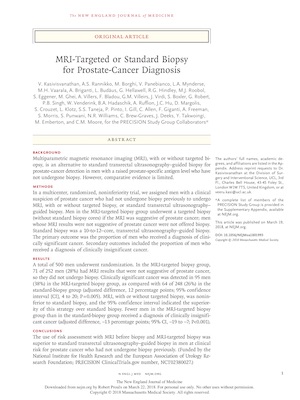 This article represents the viewpoint of management.
This article represents the viewpoint of management.
MagSense® technology is taking a leading position amidst a broad trend in cancer medicine toward finding out more, or as much as possible, about suspect tissues prior to invasive surgical biopsy.
A recent article in The New England Journal of Medicine presents the findings from a comparison of MRI-targeted or standard biopsy for prostate-cancer diagnosis. This study is important because current methods of assessing prostate cancer risk often result in overtreatment of men who are subsequently found to be free of clinically significant prostate cancer.
In the study, 28% of men with previous clinical suspicion of prostate cancer had MRI results that were not suggestive of prostate cancer and were not required to undergo prostate biopsy. Furthermore, the authors state,
“MRI, with or without targeted biopsy, led to fewer men undergoing biopsy, more clinically significant cancers being identified, less overdetection of clinically insignificant cancer, and fewer biopsy cores being obtained then did standard transrectal ultrasonography-guided biopsy.”
Imagion Biosystems is developing MagSense technology to extend and surpass the capabilities of current diagnostic imaging systems by delivering potentially life-saving information about suspicious tissues without surgical biopsy. In vivo pre-clinical studies have demonstrated the ability of MagSense technology to detect small numbers of cancer cells, as well as the ability to differentiate between different types of cancer cells, in whole, live animals. This means that MagSense has the capability of interrogating tissues at a molecular level and determining whether a specific form of cancer is present, without requiring surgical biopsy or any other invasive method of extracting suspect tissue for laboratory analysis. This capability squarely positions MagSense technology on the vanguard of the medical trend toward obtaining deeper knowledge of suspicious tissues prior to invasive surgical biopsy.

